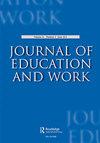成年学生的角色一致性与学习投入:一个系列间接效应模型
IF 1.7
Q2 EDUCATION & EDUCATIONAL RESEARCH
引用次数: 0
摘要
摘要:我们通过测试一系列间接效应模型,研究了成熟的老年非传统学生(非全日制学习、全职工作)如何管理他们的多重角色,在该模型中,学生角色一致性(即学生构建角色边界以满足自己和他人偏好的程度)与学习参与度有关,以及工作-学习冲突/促进和疲惫是解释这种关系的根本机制。我们还解开了不同角色边界(即工作、学习、家庭、休闲)之间的一致性,以评估哪些对促进参与更重要。我们发现,(N=211;M=37岁;65%的女性),学习参与度是通过学习(直接和间接)和休闲一致性(间接)来预测的,而不是工作和家庭一致性,这些关系可以通过减少冲突(而不是促进)来解释,进而减少疲惫。这项研究表明,学生如何管理他们的多重角色边界很重要,因为这可能会影响他们的学习参与度。本文章由计算机程序翻译,如有差异,请以英文原文为准。
Role congruence and study engagement in mature-age students: a serial indirect effects model
ABSTRACT We examined how mature-aged, non-traditional students (studying part-time, working full-time) managed their multiple roles by testing a serial, indirect effects model, in which student role congruence (i.e., extent to which students structure role boundaries to meet their own and others’ preferences) was related to study engagement, and where work-study conflict/facilitation and exhaustion, in sequence, were underlying mechanisms that explained this relationship. We also untangled congruence between different role boundaries (i.e., work, study, family, leisure) to assess which were more important to facilitate engagement. We found, (N = 211; M = 37 years; 65% women), study engagement was predicted by study (direct and indirect) and leisure congruence (indirect), but not work and family congruence, with these relationships explained by reduced conflict (not facilitation) and, in turn, less exhaustion. The study suggests that how students manage their multiple role boundaries is important as this potentially affects their study engagement.
求助全文
通过发布文献求助,成功后即可免费获取论文全文。
去求助
来源期刊

Journal of Education and Work
EDUCATION & EDUCATIONAL RESEARCH-
CiteScore
2.70
自引率
14.30%
发文量
40
期刊介绍:
The Journal of Education and Work is an international forum for academic research and policy analysis which focuses on the interplay of the education and economic systems. The journal examines how knowledge, skills, values and attitudes both about and for work and employment are developed within the education system. The journal also explores the various forms of industrial training and accreditation in the economic system, including changes in the economic and industrial infrastructure which influence the type of employees required. Work in the informal economy is also included.
 求助内容:
求助内容: 应助结果提醒方式:
应助结果提醒方式:


